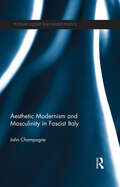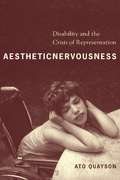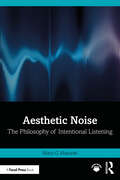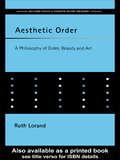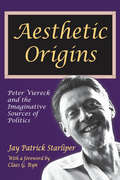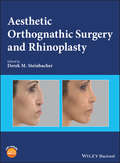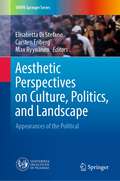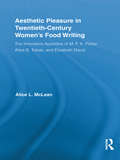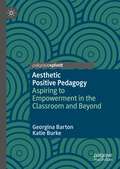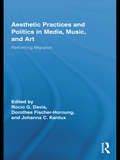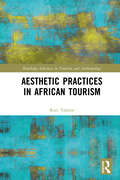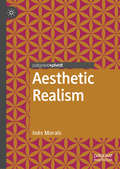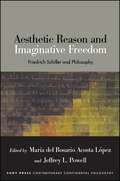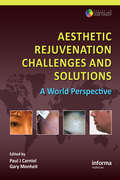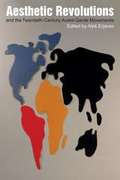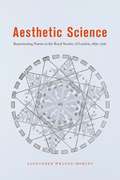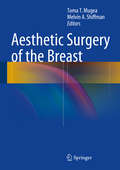- Table View
- List View
Aesthetic Modernism and Masculinity in Fascist Italy (Popular Culture and World Politics)
by John ChampagneAesthetic Modernism and Masculinity in Fascist Italy is an interdisciplinary historical re-reading of a series of representative texts that complicate our current understanding of the portrayal of masculinity in the Italian fascist era. Examining paintings, films, music and literature in light of some of the ideological and material contradictions that animated the regime, it argues that fascist masculinity was itself highly contradictory. It brings to the fore works that have tended to be under-studied, and argues that, while fascist inclusive strategies of patronage worked to bind artists to the regime, an official policy of non-interference may inadvertently have opened up a space whereby the arts expressed a more complicated and contestatory view of masculinity than the one proffered by kitsch photos of a bare-chested Mussolini skiing. Champagne seeks to evaluate how the aesthetic analysis of the artefacts explored offer a more sophisticated and nuanced understanding of what world politics is, what is at stake when something – like masculinity – is rendered as being an element of world politics, and how such an understanding differs from more orthodox ‘cultural’ analyses common to international relations. Providing a significant contribution to understandings of representations of masculinities in modernist art, this work will be of great interest to students and scholars of gender studies, queer studies, political science, Italian studies and art history.
Aesthetic Nervousness: Disability and the Crisis of Representation
by Ato QuaysonFocusing primarily on the work of Samuel Beckett, Toni Morrison, Wole Soyinka, and J. M. Coetzee, Ato Quayson launches a thoroughly cross-cultural, interdisciplinary study of the representation of physical disability. Quayson suggests that the subliminal unease and moral panic invoked by the disabled is refracted within the structures of literature and literary discourse itself, a crisis he terms "aesthetic nervousness." The disabled reminds the able-bodied that the body is provisional and temporary and that normality is wrapped up in certain social frameworks. Quayson expands his argument by turning to Greek and Yoruba writings, African American and postcolonial literature, depictions of deformed characters in early modern England and the plays of Shakespeare, and children's films, among other texts. He considers how disability affects interpersonal relationships and forces the character and the reader to take an ethical standpoint, much like representations of violence, pain, and the sacred. The disabled are also used to represent social suffering, inadvertently obscuring their true hardships.
Aesthetic Noise: The Philosophy of Intentional Listening
by Mary G. MazurekAesthetic Noise: The Philosophy of Intentional Listening considers the complex nature of noise within the framework of philosophical filtering, examining how, if noise is engaged with aesthetically, it can produce profound experiences and understandings.Applying the philosophies of Edmund Burke, Martin Heidegger, Jacque Derrida, and Julia Kristeva to works by Luigi Russolo, John Cage, Steve Reich, Alison Knowles, Annea Lockwood, Alyce Santoro, and Sunn O))), this book explores noise as an art material, and ultimately how it can become a tool for activism and expanded creative possibilities. It demonstrates that, by engaging multiple philosophies in concert, the value of aesthetic noise is amplified, thus allowing the listener to better appreciate noise and its possibilities.Providing greater insights into noise as an aesthetic material, Aesthetic Noise will be of interest to researchers and students of sound studies, philosophy, and sound art, as well as sound designers, artists, musicians, and composers.
Aesthetic Order: A Philosophy of Order, Beauty and Art (Routledge Studies in Twentieth-Century Philosophy)
by Ruth LorandAesthetic Order challenges contemporary theories of aesthetics, offering the idea of beauty as quantitative yet different from the traditional discursive order. It will be of importance to all interested in aesthetic theory.
Aesthetic Origins: Peter Viereck and the Imaginative Sources of Politics
by Claes G. Ryn Jay Patrick StarliperWhile it is gaining in academic prominence, discussion of the imagination is too often neglected. Society is dangerously unaware of the intimate relationship between culture and politics, ethics and aesthetics. Challenging this, Jay Patrick Starliper examines the imagination through the lens of the work of Peter Viereck and other likeminded thinkers. The result is a philosophical deconstruction that demonstrates why books are bullets.In 1941, before Nazi barbarism was public knowledge, a young Peter Viereck published Metapolitics: From Wagner and the German Romantics to Hitler. In it, Viereck attacked the diabolical spiritual foundations of National Socialism. He made the ostensibly absurd claim that a certain shade of romanticism was the ethical foundation of a German revolt against decency. According to Viereck, Nazism was the culmination of over a century and a half of bad culture, the result of an idyllic imagination. Starliper warns that the same diseased imagination that culminated in gas chambers and guillotines is subtly affecting the way millions of people view the world today and that, without the inspiration of an elevated aesthetic, civilization will not survive.In the spirit of Edmund Burke and Irving Babbitt, Viereck's insight into the ethical and political force of aesthetics provides a much needed critique of contemporary civilization.
Aesthetic Orthognathic Surgery and Rhinoplasty
by Derek M. SteinbacherComprehensive in scope, Aesthetic Orthognathic Surgery and Rhinoplasty presents orthognathic surgery from an aesthetic perspective, encompassing analysis, diagnosis, treatment, 3D virtual planning, and adjunctive procedures. Easily accessible clinical information presented in a concise and approachable format Well-illustrated throughout with more than 1,000 clinical photographs Includes access to a companion website with videos of surgical procedures
Aesthetic Perceptions of Urban Environments (Interventions)
by Arundhati VirmaniTo what extent do urban dwellers relate to their lived and imagined environment through aesthetic perceptions, and aspirations? This book approaches experiences of urban aesthetics not as an established framework, defined by imposed norms or legislations, but as the result of a continuous reflexive and proactive gaze, a complex and deep engagement of the mind, body and sensibilities. It uses empirical studies ranging from China, India to Western Europe. Three axes are privileged. The first considers urban everyday aesthetic experiences in the long-term as a historical production, from medieval Italy to a future imagined by science fiction. The second examines the impact of aestheticizing everyday material realities in neighbourhoods, and the tensions and conflicts these engender around urban commons. Finally, the third axis considers these relationships as aesthetic inequalities, exacerbated in a new age of urban development. The book combines local and transnational scales with an interdisciplinary approach, bringing together historians, sociologists, cultural geographers, anthropologists, architects, and contemporary art curators. They illustrate the importance of combining different social science methods and functional perspectives to study such complex social and cultural realities as cities. This book will be of interest to students, scholars and practitioners of humanities and social sciences, cultural and urban studies, architecture and political geography.
Aesthetic Perspectives on Culture, Politics, and Landscape: Appearances of the Political (UNIPA Springer Series)
by Max Ryynänen Elisabetta Di Stefano Carsten FribergThis book investigates how we are involved in politically informed structures and how they appear to us. Following different approaches in contemporary aesthetics and cultural philosophy, such as everyday aesthetics, atmosphere and aestheticization, the contributions explore how embedded powers in politics, education, democracy, and landscape are analyzed through aesthetics.
Aesthetic Plastic Surgery of the Abdomen
by Melvin A. Shiffman Alberto Di GiuseppeThis comprehensive book covers anatomy, recent techniques, postoperative care, possible complications and outcomes in aesthetic surgery of the abdomen. The extensive section on aesthetic procedures includes many important innovations in abdominoplasty. Detailed consideration is also given to the various potential complications, with guidance on their prevention, diagnosis, and management. The book is written by acknowledged experts in the topics on which they write. It will be of value for residents and fellows and more experienced surgeons in the fields of plastic surgery, general surgery, cosmetic surgery and general surgery.
Aesthetic Pleasure in Twentieth-Century Women's Food Writing: The Innovative Appetites of M.F.K. Fisher, Alice B. Toklas, and Elizabeth David (Routledge Studies in Twentieth-Century Literature)
by Alice McLeanThis book explores the aesthetic pleasures of eating and writing in the lives of M. F. K. Fisher (1908-1992), Alice B. Toklas (1877-1967), and Elizabeth David (1913-1992). Growing up during a time when women's food writing was largely limited to the domestic cookbook, which helped to codify the guidelines of middle class domesticity, Fisher, Toklas, and David claimed the pleasures of gastronomy previously reserved for men. Articulating a language through which female desire is artfully and publicly sated, Fisher, Toklas, and David expanded women’s food writing beyond the domestic realm by pioneering forms of self-expression that celebrate female appetite for pleasure and for culinary adventure. In so doing, they illuminate the power of genre-bending food writing to transgress and reconfigure conventional gender ideologies. For these women, food encouraged a sensory engagement with their environment and a physical receptivity toward pleasure that engendered their creative aesthetic.
Aesthetic Poetry
by Walter PaterTHE "aesthetic" poetry is neither a mere reproduction of Greek or medieval poetry, nor only an idealisation of modern life and sentiment. <P> <P> The atmosphere on which its effect depends belongs to no simple form of poetry, no actual form of life. Greek poetry, medieval or modern poetry, projects, above the realities of its time, a world in which the forms of things are transfigured. Of that transfigured world this new poetry takes possession, and sublimates beyond it another still fainter and more spectral, which is literally an artificial or "earthly paradise."
Aesthetic Positive Pedagogy: Aspiring to Empowerment in the Classroom and Beyond
by Georgina Barton Katie BurkeThis book introduces and explores a new pedagogical approach, Aesthetic Positive Pedagogy (APP), for teachers and students in a variety of educational contexts. The book is built on the need for educational institutions and communities to seriously consider a strong positive approach to learning and teaching, ultimately leading to a better world. Based on pre-existing philosophies such as positive pedagogy and critical pedagogy, APP encourages teachers to carefully consider their language use as well as other modal resources in the classroom. Using aesthetic experience as a core to learning, teachers can embed an approach to learning and teaching that supports wellbeing and resilience as well as caring and compassionate citizenship in their students. The authors outline what an APP approach to learning and teaching looks, feels and sounds like in different educational contexts such as in schools and higher education, and explore how it might be implemented in face-to-face as well as online learning. The book’s findings will apply to postgraduate students and academics in education and the creative arts, as well as teachers and leaders in schools.
Aesthetic Practices and Politics in Media, Music, and Art: Performing Migration
by Rocío G. DavisThis volume analyzes innovative forms of media and music (art installations, television commercials, photography, films, songs, telenovelas) to examine the performance of migration in contemporary culture. Though migration studies and media studies are ostensibly different fields, this transnational collection of essays addresses how their interconnection has shaped our understanding of the paradigms through which we think about migration, ethnicity, nation, and the transnational. Cultural representations intervene in collective beliefs. Art and media clearly influence the ways the experience of migration is articulated and recalled, intervening in individual perceptions as well as public policy. To understand the connection between migration and diverse media, the authors examine how migration is represented in film, television, music, and art, but also how media shape the ways in which host country and homeland are imagined. Among the topics considered are new mediated forms for representing migration, widening the perspective on the ways these representations may be analyzed; readings of enactments of memory in trans- and inter-disciplinary ways; and discussions of globalization and transnationalism, inviting us to rethink traditional borders in respect to migration, nation states, as well as disciplines.
Aesthetic Practices in African Tourism (Routledge Advances in Tourism and Anthropology)
by Ruti TalmorAesthetic Practices in African Tourism explores "Rastahood", a community, youth culture, and new tourist art form created by young men on the margins of the Ghanaian economy as they came of age at the turn of the millennium. This book focuses on art, music, and affective experience created within tourism contexts, which enabled young men without educational or class capital to achieve mobility through work with foreigners, transforming the temporal horizon by expanding the geographic one. It traces the path that led young men down the path to Rastahood and investigates how they created an art form in, and of, a particular place and then used it to propel themselves far beyond its confines. The book ends with a leap forward into the present, out of Ghana, and beyond Rastahood, as men, now in middle age, look back upon the path that Rastahood created. It explores the social effects of neoliberal capitalism, specifically the rise of neoliberal subjectivities, collectivities, and socialities. The book will be of interest to researchers in the fields of anthropology, cultural studies, tourism, art, African and Africana Studies, popular culture; gender studies; migration; youth studies and those interested in African cities.
Aesthetic Procedures: Nurse Practitioner's Guide to Cosmetic Dermatology
by Beth HaneyThis book is a resource that offers guidance to nurses who are experienced or novice aesthetic practitioners and would like to improve their aesthetic practice and enhance patient safety and satisfaction. This textbook reviews skin structure and anatomy, what happens as facial structures age, the effects of aging coupled with environmental exposures, pharmacology of medications used in aesthetics, light-based device properties, patient selection, and benefits of treatments. In addition, it includes suggestions on how to communicate with patients to achieve successful outcomes. Aesthetic Procedures: Nurse Practitioner's Guide to Cosmetic Dermatology provides practitioners a one-source resource to attain more in-depth learning about cosmetic dermatology. Although there are several texts on individual aspects of aesthetic medicine, there is no all-inclusive book for nurses. This book affords the primary care practitioner the opportunity to add minimally invasive cosmetic dermatology procedures to their practice and perform the treatments safely, efficiently and effectively while avoiding common mistakes and minimizing complication risks. Education is paramount in creating a safe patient environment and as more clinicians turn to aesthetics to augment their practice, this book will be a valuable resource for nurses and practitioners all over the world.
Aesthetic Procedures: Nurse Practitioner's Guide to Cosmetic Dermatology
by Beth HaneyThis second edition is a resource that offers guidance to advanced practice providers who are experienced or novice aesthetic practitioners and would like to improve their aesthetic practice and enhance patient safety and satisfaction. This new book reviews skin structure and anatomy, what happens as facial structures age, the effects of aging coupled with environmental exposures, pharmacology of medications used in aesthetics, light-based device properties, patient selection, danger zones, complications, new treatments, and benefits of treatments. In addition, it includes suggestions on how to communicate with patients to achieve successful outcomes. Aesthetic Procedures: Nurse Practitioner's Guide to Cosmetic Dermatology provides practitioners a one-source resource to attain more in-depth learning about cosmetic dermatology. Although there are several texts on individual aspects of aesthetic medicine, there is no all-inclusive book for advanced practice providers. This book also affords the primary care practitioner the opportunity to add minimally invasive cosmetic dermatology procedures to their practice and perform the treatments safely, efficiently and effectively while avoiding common mistakes and minimizing complication risks. Education and hands-on practice and training are paramount in creating a safe patient environment and as more clinicians turn to aesthetics to augment their practice, this book will be a valuable resource for practitioners all over the world.
Aesthetic Realism
by Inês MoraisThis compelling book defends realism concerning the aesthetic—in particular, concerning the aesthetic properties of works of art (including works of literature). Morais lucidly argues that art criticism, when referring to aesthetic properties, is referring not ultimately to the critic’s subjective reactions, but to genuine properties of the works. With a focus on contemporary discussion conducted in the analytic tradition, as well as on arguments by Hume and Kant, this book characterizes the debate in aesthetics and the philosophy of art concerning aesthetic realism, examining attacks on the objectivity of values, the ‘autonomy thesis’, and Hume’s sentimentalism. Considering and defusing scepticism concerning the significance of the ontological debate about aesthetic realism, Morais discusses two powerful attacks on aesthetic realism before defending the doctrine against them and providing a positive realist account of aesthetic properties.
Aesthetic Reason and Imaginative Freedom: Friedrich Schiller and Philosophy (SUNY series in Contemporary Continental Philosophy)
by María del Rosario Acosta López; Jeffrey L. PowellThis book seeks to draw attention to Friedrich Schiller (1759–1805) as a philosophical thinker in his own right. For too long, his philosophical contribution has been neglected in favor of his much-deserved reputation as a political playwright. The essays in this collection make two arguments. First, Schiller presents a robust philosophical program that can be favorably compared to those of his age, including Rousseau, Kant, Schelling, and Hegel, and he proves to be their equal in his thinking on morality, aesthetics, and politics. Second, Schiller can also guide us in our more contemporary philosophical concerns and approaches, such as phenomenology, hermeneutics, aesthetics, and politics. Here, Schiller instructs us in our engagement with figures such as Walter Benjamin, Michel Foucault, Jacques Rancière, Roberto Esposito, and others.
Aesthetic Rejuvenation Challenges and Solutions: A World Perspective (Series in Cosmetic and Laser Therapy)
by Paul J Carniol Gary D MonheitPractitioners of aesthetic medicine and surgery already have a series of textbooks instructing on how to treat the standard patient. Unfortunately, they also have patients who do not conform to the average-those who are of a different age, or sex, ethnicity, or medical history, or who have special social requirements. Aesthetic Rejuvenation Challen
Aesthetic Revolutions and Twentieth-Century Avant-Garde Movements
by Aleš ErjavecThis collection examines key aesthetic avant-garde art movements of the twentieth century and their relationships with revolutionary politics. The contributors distinguish aesthetic avant-gardes --whose artists aim to transform society and the ways of sensing the world through political means--from the artistic avant-gardes, which focus on transforming representation. Following the work of philosophers such as Friedrich Schiller and Jacques Rancière, the contributors argue that the aesthetic is inherently political and that aesthetic avant-garde art is essential for political revolution. In addition to analyzing Russian constructivsm, surrealism, and Situationist International, the contributors examine Italian futurism's model of integrating art with politics and life, the murals of revolutionary Mexico and Nicaragua, 1960s American art, and the Slovenian art collective NSK's construction of a fictional political state in the 1990s. Aesthetic Revolutions and Twentieth-Century Avant-Garde Movements traces the common foundations and goals shared by these disparate arts communities and shows how their art worked towards effecting political and social change. Contributors. John E. Bowlt, Sascha Bru, David Craven, Aleš Erjavec, Tyrus Miller, Raymond Spiteri, Miško Šuvakovic
Aesthetic Science: Representing Nature in the Royal Society of London, 1650-1720
by Alexander Wragge-MorleyThe scientists affiliated with the early Royal Society of London have long been regarded as forerunners of modern empiricism, rejecting the symbolic and moral goals of Renaissance natural history in favor of plainly representing the world as it really was. In Aesthetic Science, Alexander Wragge-Morley challenges this interpretation by arguing that key figures such as John Ray, Robert Boyle, Nehemiah Grew, Robert Hooke, and Thomas Willis saw the study of nature as an aesthetic project. To show how early modern naturalists conceived of the interplay between sensory experience and the production of knowledge, Aesthetic Science explores natural-historical and anatomical works of the Royal Society through the lens of the aesthetic. By underscoring the importance of subjective experience to the communication of knowledge about nature, Wragge-Morley offers a groundbreaking reconsideration of scientific representation in the early modern period and brings to light the hitherto overlooked role of aesthetic experience in the history of the empirical sciences.
Aesthetic Septorhinoplasty
by Barış ÇakırThis superbly illustrated book describes how techniques previously developed by Dr. Rollin Daniel for use in open rhinoplasty can be adapted for use in the closed approach. It is the author's opinion that this combination offers greater feedback during surgery, a shorter recovery period and absence of scar. Full explanation is provided of preoperative preparation, including evaluation of the nasal surface aesthetics using the concept of geometric polygons as aesthetic subunits to define both the existing deformity and the aesthetic goals. The surgical techniques developed and modified to achieve the desired surface appearance are then described step by step with the aid of a wealth of color photos. It is illustrated how the novel dissection and redrape control methods reduce the healing time and enhance outcome and an extensive series of case analyses is presented to document the benefits of the approach. The book is written in a "cookbook format" that will enable plastic surgeons quickly to learn how to utilize the closed approach to rhinoplasty to optimal aesthetic benefit.
Aesthetic Septorhinoplasty
by Barış ÇakırThis extensively revised second edition describes how techniques previously developed by Dr. Rollin Daniel for use in open rhinoplasty can be adapted for the closed approach. The author argues that this offers greater feedback during surgery, a shorter recovery period and absence of scarring. The book includes a full explanation of preoperative preparation, including evaluation of the nasal surface aesthetics using the concept of geometric polygons as aesthetic subunits to define both the existing deformity and the aesthetic goals. Aided by a wealth of color photos, it also provides step-by-step descriptions of the surgical techniques developed and modified to achieve the desired surface appearance, and illustrates how the novel dissection and redrape control methods reduce the healing time and enhance outcomes. Further, the book presents a series of case analyses documenting the benefits of the approach. Written in a “cookbook style" this superbly illustrated book enables plastic surgeons to quickly learn how to utilize the closed approach to rhinoplasty for optimal aesthetic benefit.
Aesthetic Surgery of the Breast
by Melvin A. Shiffman Toma T. MugeaThis book covers all aspects of aesthetic breast surgery in an instructive, step-by-step format. The descriptions of procedures are completely up to date, encompassing newly introduced techniques and recent modifications of established techniques. Individual parts of the book are devoted to breast augmentation, mastopexy, and breast reduction. Detailed consideration is also given to risks and complications, with guidance on their avoidance and the treatment of complications. In addition, anatomy, anesthesia, and a range of miscellaneous procedures applicable in specific circumstances are all well covered The authors are acknowledged experts in their fields who draw on a wealth of experience in describing and illustrating their personally favored techniques. Aesthetic Surgery of the Breast will be an ideal reference for both students (residents and fellows) and practicing cosmetic, plastic, and general surgeons.
Aesthetic Surgery of the Buttock: A Comprehensive Clinical Guide
by Daniel Del Vecchio Héctor DuránIn the past five years, buttock surgery has been changing and expanding worldwide, while also attracting media attention. Surgeons have been confronted with a shocking number of requests for buttock augmentation surgeries. Further, as patients become more complex, more complex procedures are called for, such as fat infiltration surgery combined with implants or, for example, modifying the waist-to-hip ratio.Aesthetic Surgery of the Buttock is the first book of its kind, covering all relevant aesthetic issues. It offers essential guidance on performing surgery, but also on avoiding complications due to fat infiltration in large blood vessels and thus avoiding embolisms at the pulmonary level. In addition, much of the book addresses various aspects of fat infiltration, e.g. obtaining, processing and applying this fat. It also discusses implants, which are an excellent option for many patients, as well as new trends in the combination of fat infiltration and implants to achieve more natural results. Given its scope, it represents an invaluable asset for all plastic surgeons around the globe who perform body-contouring surgeries.
